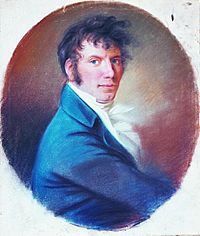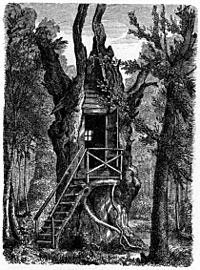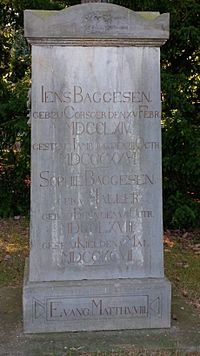Jens Baggesen facts for kids
Quick facts for kids
Jens Baggesen
|
|
|---|---|

Jens Baggesen, pastel by Christian Horneman made during a visit to Copenhagen in 1806 from Paris where Baggesen lived at the time
|
|
| Born | Jens Immanuel Baggesen 15 February 1764 Korsør, Denmark |
| Died | 3 October 1826 (aged 62) Hamburg, German Confederation |
| Occupation | Poet |
| Nationality | Danish |
| Literary movement | Romanticism |
| Notable works | Labyrinten "Da Jeg Var Lille" |
| Signature | |
 |
|
Jens Immanuel Baggesen (born February 15, 1764 – died October 3, 1826) was a famous Danish poet. He also wrote librettos for operas, worked as a critic, and created funny stories.
Contents
A Poet's Life

Jens Baggesen was born in Korsør, a town on the Danish island of Zealand. His family was very poor. Before he was 12 years old, he had to work. He copied documents for a clerk in the Hornsherred area.
Even though he faced challenges, Jens worked very hard to get an education. In 1782, he was able to attend the University of Copenhagen.
Early Success and Challenges
When Jens was 21, he published his first book. It was a collection of funny poems called Comical Tales. People in the capital city loved it! He quickly became a popular poet.
After this, he tried writing more serious lyric poetry. He was polite and charming, and he could write about many different things. This helped him become part of the best social groups.
However, in March 1789, he faced a big setback. His opera called Holger Danske was not well received. People made fun of its mistakes. There was also a strong debate about Danish national pride. Some people were upset because Baggesen was connected to Germans.
Feeling angry, he left Denmark. He spent the next few years traveling in Germany, France, and Switzerland.
Writing in Different Languages
In 1790, Jens got married in Bern, Switzerland. He started writing in German. His next poem, Alpenlied ("Alpine Song"), was in German.
When he returned to Denmark later that year, he brought a gift. It was a Danish poem called Labyrinten ("Labyrinth"). This poem was very popular and welcomed him back.
For the next 20 years, he wrote books in both Danish and German. He traveled a lot across northern Europe. He mostly lived in Paris. One of his important German works from this time was Parthenais (1803). It was a long poem about an ideal, peaceful life.
Later Years and Legacy
In 1806, Jens visited Copenhagen again. He found that a younger poet, Oehlenschläger, was now seen as the greatest poet. Jens's own popularity was fading.
He stayed in Denmark for a while. During this time, he got into many arguments with other writers. He really wanted people to believe he was a greater poet than Oehlenschläger.
In 1820, he left for Paris again. Sadly, he lost his second wife and youngest child in 1822. He also faced financial difficulties and was even held for his debts. He became very sad and unwell.
After feeling a little better, he decided to visit Denmark one last time. But he died on the way, in a hospital in Hamburg, Germany, on October 3, 1826. He was buried in Kiel.
What He Left Behind
Jens Baggesen was talented in many types of writing. His funny poems are still remembered today. His writing style was very polished and elegant. It had a big impact on later Danish literature. He is seen as a key figure between two other important Danish writers, Holberg and Oehlenschläger.
His most famous work is a simple song called Da Jeg Var Lille ("There Was a Time when I Was Very Little"). A century after his death, almost everyone in Denmark knew this song by heart. It is still popular today and is remembered more than his longer poems.
There is a statue of Jens Baggesen in Korsør, where he was born. It was put up on May 6, 1906. There is also a hotel in the area named after him.
See also
 In Spanish: Jens Immanuel Baggesen para niños
In Spanish: Jens Immanuel Baggesen para niños
 | James B. Knighten |
 | Azellia White |
 | Willa Brown |


